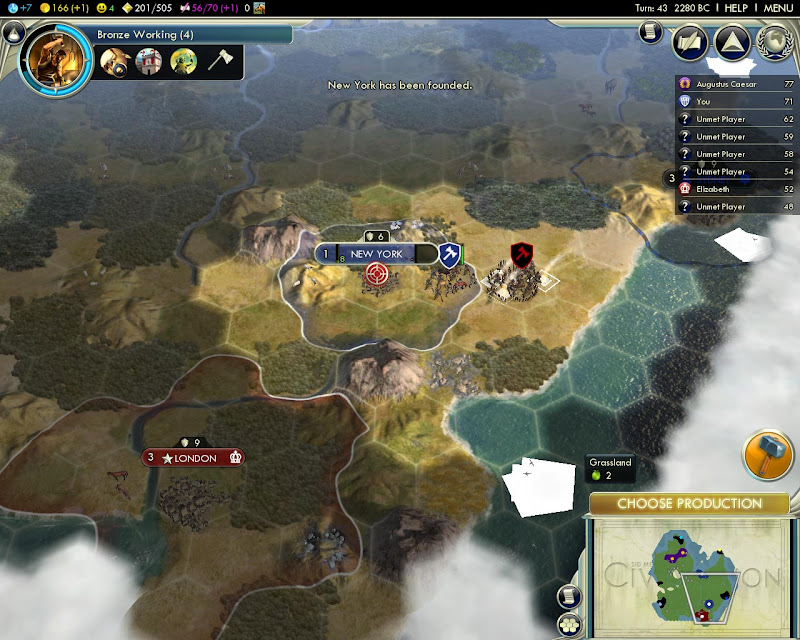America

 Washington
Washington


Introduction
In its founding and since, America has been a civilization in many ways shaped and defined by its wars. From the ideals of the Revolutionary War to its government-defining Civil War to the industrial burgeoning and nuclear unleashing of the World Wars, America's military history has been taken to Civ 5's heart, producing a civilization that plays somewhat differently than its past incarnations.
Key Concepts
Land-Grab: Early claiming of land and seizing important choke points.
Spawnbusting: Preventing barbarians from appearing by making sure that tiles are visible.
Manifest Destiny
The American Unique Ability is often debated and derided for its relative value. It comes in two parts, one consistently useful and one situationally useful.
The consistently useful ability is that land military units receive +1 sight. This doesn't sound that great on paper; you'll see things next turn anyway. However, it starts being useful at the beginning of the game and stays useful right up until the end -- for different reasons.
In the early game, scouting is crucial. Meeting city-states first, getting a feel for the land so that you know what your strategy will need to be, finding and popping ruins -- in all these things, America has a decided edge. By the time you start sending out settlers, you will likely have a far more comprehensive knowledge of the map than were you playing another Civ, and will have done it far more efficiently. To capitalize on this, make sure you're sending your cities to the ideal spots -- depending on difficulty level, this could be resource spots, defensive spots, or blocking spots. Again, this benefit is hard to describe numerically or on paper, but it is there and should be used.

The increased visual range also comes into play in dealing with Barbarians. For simply the cost of a scouting promotion, your Scouts can have a nice +2 visibility, enabling you to spawn-bust entire swaths of land. Not only that, but your city garrisons early on will be able to survey more of the land, allowing you to detect and deal with Barbarians that much more early. As America, you should be in total control of when and if Barbarians spawn near your cities, and you should be able to do it with far fewer units.
When you're getting ready for war, this visibility will come in handy once again; it will allow your mobile units (mounted/armor) a better sense of where to go and whom to attack, it can allow your foot units to avoid traps and pitfalls, and -- perhaps most importantly -- it increases the sight range of your siege units. While scouting alone makes the ability worth it, being able to counteract the "limited visibility" promotion of siege units means that your siege units can fire without needing a spotter (someone to provide vision for siege units' range), and America has an easier time spotting for Artillery with their three range. After the early land-grab, if you are not warring with somebody as America, you're denying yourself the full value of the extended vision of Manifest Destiny.
The value of this extra sight only starts to peter out with the advent of flight and Fighters for scouting, but even then, do not underestimate the utility of extra sight for your land units in any invasion; your land units can spot for air attacks as well as they can for siege attacks.
The second part of Manifest Destiny concerns the gold cost of buying tiles, and hearkens back to the Lousiana Purchase, wherein America paid France to acquire a great deal of what would become the Central United States. Quite simply, America receives a discount on purchasing tiles. This has some natural synergy with pursuing Angkor Wat, and more so with their extended vision. The key here is to not go purchase-crazy; the key is recognizing situations where buying the tile is the right move.
In the early game, use it to close off pathways and chokepoints so that other civs can't get past a far-settled city without declaring war. Use it as well to get those happiness resources hooked up sooner, if you've needed to position your city in such a way that some will be in the outside ring. Use it when Iron and Horses are revealed to quickly make the tiles workable and connectable.
Of course, if you're saving up money for this, it means you likely won't be spending it on city-states. If you're settling the best spots on the continent and blocking off your opponents, it's going to irritate them. Extremely. Buying tiles is a goad to get your enemies to declare on you, where you can use your superior vision to help you wipe out opponents. Make no mistake -- from start to finish, America is a Warmonger Civ.
Examples and Screenshots for Manifest Destiny
Spoiler Fig. 1 :
Spoiler Fig. 2 :
Spoiler Fig. 3 :
Spoiler Fig. 4 :
Spoiler Fig. 5 :
Spoiler Fig. 6 :
Spoiler Fig. 7 :
Spoiler Fig. 8 :
Spoiler Fig. 9 :

The Minuteman is a Musketman replacement that starts with Drill I (bonus in rough terrain) and ignores terrain movement costs. Because it is a Musket replacement, you will not be able to upgrade earlier units; you must hand-build each one. On the other hand, it requires no strategic resource to build, so you can always be sure you're getting them. Depending on the map type, they should come when you have cemented dominance of your continent and are looking hungrily overseas. Minutemen flourish naturally as pillagers and advance troops. Their free Drill Promotion gives them a head start on the path to March, and their ability to run roughshod over hill and through forest should allow you to pillage mines and lumbermills while standing firm against reprisal, essentially destroying a civ's production capacity. With Civ 5's absence of war weariness and ability for both sides to survive a round of battle, your Minutemen should be able to give your opponent headaches at little to no cost to yourself. The absence of terrain movement cost also greatly eases the logistics of troop movement; your Minutemen can get themselves in position to assault a city without clogging the lanes for your Siege. Overall, like the UA, the Minuteman is solid without seeming spectacular; better once you're actually playing than it looks on paper.
Examples and Screenshots for Minutemen
Spoiler Fig. 1 :
Spoiler Fig. 2 :

America has traditionally had a late-game unit that's derided by most for its timing. While the B17 Bomber is a late-game unit, it is a thing of beauty. The B17 starts with Siege I and Evasion I, enhancing their survivability and allowing them to do more damage against cities in the Modern Era. These promotions put you on the fast track for Logistics, allowing your Bombers to bomb twice, as well as Air Repair, the flight equivalent of March. B17s require Oil, as do Bombers, which means that Biology should be a priority tech as well as seizing sources of said resource once revealed. If you've been doing your job and taking over your continent, you should hopefully have a nice supply. As with your other Unique Unit, you will be building these from scratch, but whatever production centers you were using for your Musketmen will probably work as well, here. Unlike Musketmen, B17s do not obsolete, even though they upgrade to Stealth Bombers. The Americans, therefore, will continue producing B17s even in the stealth era, then upgrading them to take advantage of the freely offered promotions. This essentially gives America another modern-era UU, and bodes well for American Air dominance.
Bombers require that a land unit have line of sight for targets. To make full use of their operational flight range, they require forward land units to be within visible range of a city. Of course, with America's Manifest Destiny UA, it means land units can remain one extra tile away from a city, swapping out with each other to survive a city's firing ability until said city is weak enough to be captured.
Additionally, Stealth Bombers can't rebase to aircraft carriers. The B-17 build to Stealth Bomber upgrade track can be halted when you need to pound an island or coastal city into submission with air power attached to your fleet. If you don't want to conquer or build a new city for getting your bombers in range, this a useful, if rarely necessary, tactic.
Other than their advanced promotions, though, the standard bomber tactics apply (see the Modern & Future Units Guide). For those who have mastered the intricacies of Research Agreements and Bulbing, Bombers and Stealth are actually not that far away, but even a more relaxed pace gives you a very useful unit.
Examples and Screenshots for B-17 Bombers
Spoiler Fig. 1 :
Spoiler Fig. 2 :
Spoiler Fig. 3 :
America-Specific Strategies
As mentioned before, America is a warmonger Civ. You're not out there to play peacefully, you're out there to win by destroying your neighbors. With an early game focused on the Land-Grab and spawnbusting, Liberty might sound like a tempting policy tree, but you need to be thinking long-term. The advantage of both the Minuteman and the B17 is their easier access to deeper promotions, and in the case of B17s the ability to build and upgrade while Stealth Bombers are available. Pick Honor with the Americans; you'll know where more Barbarian camps are thanks to your more effective scouting; you'll be able to kill Barbarians for culture, eventually you will be generating culture with the garrison units you were going to buy anyway, and the maintenance-free happiness of Walls and Castles that you were likely going to be building anyway in your outlying cities all point to Honor as the tree to go for and fill out. Later in the game, if you've reached Stealth technology, you'll want to be building B17s and upgrading them to Stealth Bombers, which also points to Honor as a tree to possess.

On the other hand, there are some advantages in temporarily puppeting a city, such as using it for gold farming; indeed, a puppeted city having been used for gold production can have its buildings sold off, have itself razed to the ground, and then its annexed neighbors can quickly buy up the newly vacated tiles at half the cost everybody else pays. A puppeted city in the later game can also be used as an airbase, which can at times mitigate an otherwise lousy position. Since planes have to advance to conquered frontier cities to bomb your next target into the ground, choosing which cities to keep and which to drop becomes a matter of maximizing your forward air support with your land and sea units. If your enemy has pursued a "wide" empire settling strategy (very common from the AI), you can skip the tougher positions, take out a smaller target and cut off an enemy city's contact with with his production centers, not to mention breaking trade routes. Isolating a few cities from your enemy's capital at one time can eat into his gold supply (depending on difficulty level) while he's still fighting a war with you. Puppeteering on a temporary basis can also mitigate happiness concerns that come from full-on annexation, though Honor still gives you rather good Happiness options.
With so much of their early- and mid-game having to do with the strength of their land warring, it should be obvious that America grows stronger the more land there is; Archipelago and Small maps will be their bane, low sea levels, continents+ and standard size+ will allow more of their strengths to come to the fore. With their advantages in Scouting and Land-grabbing, the rarer resources are, the more America will have value, and conversely more frequent Barbarians make for a stronger America.
Examples and Screenshots from Civilization Specific Strategies
Spoiler Fig. 1 :
Spoiler Fig. 2 :
Spoiler Fig. 3 :
Spoiler Fig. 4 :
Conclusion
The image of the Warmonger as set forth for America in Civ 5 is surprisingly accurate, reflecting a Nation that found its birth in a war as well as the one that unleashed the nuclear bomb in World War II. When you sit down to play America, you're sitting down for war, whether with your intelligence advantage early on, your mobility advantage in the midgame, or your aggressive air power in the end game. Play to these military strengths and you won't go wrong, settle into defensive or peaceful postures and you will find the American's strength fading into a mediocre and meandering game.
Patch version of this article: 1.0.1.383


















